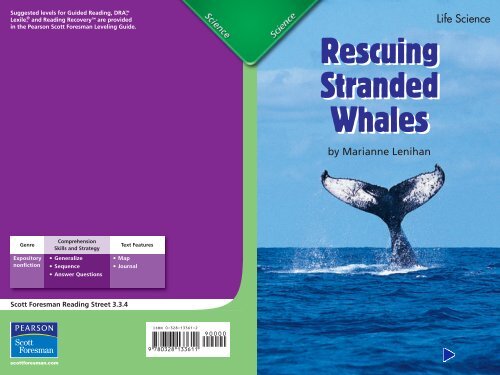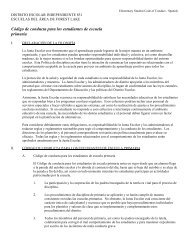Rescuing Stranded Whales - Catawba County Schools
Rescuing Stranded Whales - Catawba County Schools
Rescuing Stranded Whales - Catawba County Schools
Create successful ePaper yourself
Turn your PDF publications into a flip-book with our unique Google optimized e-Paper software.
Suggested levels for Guided Reading, DRA, <br />
Lexile, ® and Reading Recovery are provided<br />
in the Pearson Scott Foresman Leveling Guide.<br />
Life Science<br />
<strong>Rescuing</strong><br />
<strong>Stranded</strong><br />
<strong>Whales</strong><br />
by Marianne Lenihan<br />
Genre<br />
Expository<br />
nonfiction<br />
Comprehension<br />
Skills and Strategy<br />
• Generalize<br />
• Sequence<br />
• Answer Questions<br />
Text Features<br />
• Map<br />
• Journal<br />
Scott Foresman Reading Street 3.3.4<br />
ì
Reader Response<br />
<strong>Rescuing</strong><br />
<strong>Stranded</strong><br />
1. How might the rescue of dolphins be<br />
similar to the rescue of whales?<br />
2. After reading about how whales are<br />
rescued, what<br />
<strong>Whales</strong><br />
other questions do you<br />
have about whales? How would you find<br />
answers to your questions? Use a graphic<br />
organizer to help arrange your thoughts.<br />
What I Know<br />
by Marianne Lenihan<br />
What I Want<br />
To Know<br />
What I<br />
Learned<br />
3. Rescuers surrounded the stranded whales.<br />
What other word or words mean almost<br />
the same as surrounded?<br />
4. In the journal on page 10, how long after<br />
the ship sets sail do the scientists spot a<br />
pod of whales?<br />
Editorial Offices: Glenview, Illinois • Parsippany, New Jersey • New York, New York<br />
Sales Offices: Needham, Massachusetts • Duluth, Georgia • Glenview, Illinois<br />
Coppell, Texas • Ontario, California • Mesa, Arizona
<strong>Whales</strong> are sea mammals. Many people<br />
like whales for the melodies of their songs.<br />
Whale songs have been called symphonies.<br />
Usually, whales swim the seas easily. But<br />
sometimes they get stuck in shallow water<br />
or grounded on a beach. This is known as<br />
being stranded or beached.<br />
Every effort has been made to secure permission and provide appropriate credit for<br />
photographic material. The publisher deeply regrets any omission and pledges to<br />
correct errors called to its attention in subsequent editions.<br />
Unless otherwise acknowledged, all photographs are the property of Scott Foresman,<br />
a division of Pearson Education.<br />
Photo locators denoted as follows: Top (T), Center (C), Bottom (B), Left (L), Right (R),<br />
Background (Bkgd)<br />
Opener: Digital Vision; 1 Digital Vision; 3 ©DK Images; 5 Digital Vision; 7 B. Jordan/<br />
UNEP/Peter Arnold, Inc.; 9 ©DK Images; 12 Digital Vision<br />
ISBN: 0-328-13361-2<br />
Copyright © Pearson Education, Inc.<br />
All Rights Reserved. Printed in the United States of America. This publication is<br />
protected by Copyright, and permission should be obtained from the publisher<br />
prior to any prohibited reproduction, storage in a retrieval system, or transmission<br />
in any form by any means, electronic, mechanical, photocopying, recording, or<br />
likewise. For information regarding permission(s), write to: Permissions Department,<br />
Scott Foresman, 1900 East Lake Avenue, Glenview, Illinois 60025.<br />
2 3 4 5 6 7 8 9 10 V0G1 14 13 12 11 10 09 08 07 06 05<br />
3
When a whale is stranded, its body<br />
weight presses on its heart and lungs. The<br />
whale can have a hard time breathing.<br />
Also, the whale’s body temperature can<br />
become very high without the cooling<br />
seawater. Its skin can dry out, crack, and<br />
become sore.<br />
Here’s how people help stranded<br />
whales: The whales are surrounded by<br />
volunteers and scientists. They pour cold<br />
water and chipped ice on the whales to<br />
keep them cool. The scientists use their<br />
supplies to do medical tests on the whales.<br />
4<br />
5
Sometimes all that stranded whales<br />
need is to be kept cool and calm until<br />
the tide rises. Then the rescuers herd the<br />
whales into a group and push them out<br />
into deeper water. If the whales find a<br />
deep channel of water, they are able to<br />
swim out to the open sea.<br />
Scientists do not fully understand why<br />
whales strand. One idea is that the lead<br />
whale becomes sick and swims off course.<br />
Then the other whales in the pod follow.<br />
Another thought is that harsh weather,<br />
such as blizzards and hurricanes, may upset<br />
the whales’ sense of direction.<br />
6<br />
7
In 1986, at Eastham, Massachusetts,<br />
three young pilot whales stranded. They<br />
had come into a shallow bay.<br />
Scientists were called to help. A crowd<br />
waited anxiously on the beach until they<br />
arrived. The scientists checked the whales.<br />
They decided to take them to an aquarium<br />
for care.<br />
The young whales were placed<br />
on stretchers. Then, front-end loaders<br />
lifted each whale into a truck. Only the<br />
front-end loaders could move the heavy<br />
whales. One by one, the three whales were<br />
lifted and placed gently into the truck.<br />
CANADA<br />
U.S.A.<br />
Atlantic<br />
Ocean<br />
Massachusetts<br />
Eastham<br />
CAPE COD<br />
8<br />
9
At the aquarium a crane moved the<br />
whales out of the truck and into a tank. It<br />
took the young whales a few days to get<br />
used to aquarium life. They were fed small<br />
fish stuffed with vitamins and medicines.<br />
This journal shows what happened<br />
on the day the whales were ready to be<br />
returned to sea!<br />
WHALE RESCUE JOURNAL<br />
8:00 A.M. Most of the water is drained<br />
from the aquarium tank.<br />
9:00 A.M. The whales are lifted out of<br />
the tank on stretchers.<br />
10:00 A.M. The stretchers are lifted by<br />
cranes into a truck.<br />
11:00 A.M. The truck drives the whales<br />
to a large ship.<br />
2:00 P.M. The whales are loaded onto<br />
the ship.<br />
4:00 P.M. The ship sets sail for deep<br />
ocean waters.<br />
6:00 P.M. The scientists on the ship<br />
search for a pod of whales.<br />
7:00 P.M. A pod of whales is spotted.<br />
Scientists fit each whale with a special<br />
radio tag to help track the whale.<br />
8:30 P.M. The stretchers are lifted by<br />
a crane. The whales are lowered into a<br />
special cage next to the ship.<br />
12:00 A.M. The whales have gotten<br />
used to the ocean water again. The cage<br />
is opened. The whales swim out to meet<br />
their new pod. Everyone cheers!<br />
10<br />
11
<strong>Whales</strong> know when they’re in trouble.<br />
Usually, they cooperate with their human<br />
rescuers. Although some whale rescues<br />
are not successful, many whales have been<br />
returned safely to their ocean home!<br />
Reader Response<br />
1. How might the rescue of dolphins be<br />
similar to the rescue of whales?<br />
2. After reading about how whales are<br />
rescued, what other questions do you<br />
have about whales? How would you find<br />
answers to your questions? Use a graphic<br />
organizer to help arrange your thoughts.<br />
What I Know<br />
What I Want<br />
To Know<br />
What I<br />
Learned<br />
3. Rescuers surrounded the stranded whales.<br />
What other word or words mean almost<br />
the same as surrounded?<br />
4. In the journal on page 10, how long after<br />
the ship sets sail do the scientists spot a<br />
pod of whales?<br />
12

















